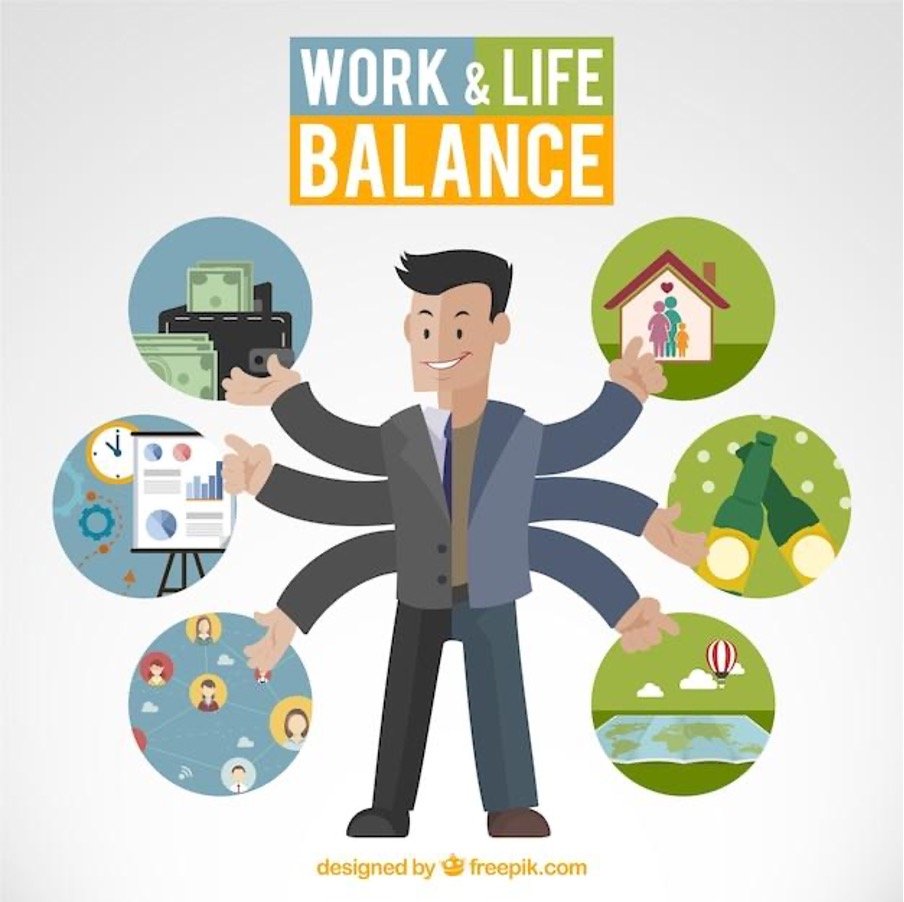Best Careers For Work Life Balance

In today's fast-paced and often demanding work environment, achieving a healthy work-life balance has become a top priority for many professionals. Striking the right equilibrium between career and personal life is crucial for overall well-being and satisfaction. While the concept of work-life balance can vary depending on individual preferences and circumstances, certain careers offer more flexibility and opportunities for a harmonious blend of professional success and personal fulfillment. This article explores some of the best careers known for their potential to provide a satisfying work-life balance.
Work-Life Balance: A Priority for Modern Professionals

The pursuit of work-life balance is not merely a trend but a necessity for modern professionals. With the blurring of traditional work boundaries due to technological advancements, the line between work and personal time has become increasingly indistinct. Recognizing the importance of self-care and personal well-being, employees are now actively seeking careers that offer flexibility, autonomy, and opportunities for growth without compromising their personal lives.
Moreover, the COVID-19 pandemic has further emphasized the need for a balanced approach to work and life. As remote work became the new norm, employees realized the value of having a career that allows for a flexible schedule and the ability to manage personal responsibilities more effectively. This shift in perspective has led to a reevaluation of career choices, with many professionals prioritizing work-life balance over purely financial or status-oriented goals.
Careers that Excel in Work-Life Balance

When it comes to careers that promote work-life balance, several factors come into play. These include flexible work hours, remote work options, autonomy in decision-making, and a culture that prioritizes employee well-being. Here are some professions that consistently rank high in terms of work-life balance opportunities.
1. Healthcare Professions
The healthcare industry offers a wide range of careers that provide excellent work-life balance. From nursing to medical research, healthcare professionals often enjoy flexible schedules and the ability to choose their working hours. For instance, nurses can opt for part-time or per-diem positions, allowing them to balance their career with personal commitments. Additionally, the nature of healthcare work often involves shifts, providing professionals with extended periods of time off between assignments.
Furthermore, the demand for healthcare services remains consistently high, ensuring job security and the ability to negotiate favorable work conditions. Whether it's working as a physician in a rural community or conducting research in a university setting, healthcare careers offer a unique blend of personal fulfillment and work-life balance.
2. Education and Teaching
Careers in education, such as teaching and academic research, are renowned for their work-life balance. Teachers, in particular, benefit from structured work schedules with dedicated vacation periods. The academic calendar provides a natural rhythm to the work year, allowing educators to plan personal activities and take time off without the stress of constant deadlines.
Additionally, the ability to shape one's own curriculum and teaching methods provides a sense of autonomy and control over one's work. Whether teaching in a traditional classroom or pursuing educational research, careers in education offer a satisfying blend of personal growth and professional fulfillment.
3. Remote Work Opportunities
The rise of remote work has opened up a world of possibilities for achieving work-life balance. Careers that can be performed remotely, such as web development, graphic design, content writing, and virtual assistance, offer unparalleled flexibility. Remote workers can choose their own hours, work from the comfort of their homes, and avoid the stress and time commitment of a daily commute.
Moreover, remote work often eliminates the need for strict office hours, allowing professionals to structure their day around personal responsibilities and priorities. This level of flexibility can be especially beneficial for parents, caregivers, and those with other commitments outside of work.
4. Freelancing and Entrepreneurship
Freelancing and entrepreneurship offer unique opportunities for individuals seeking control over their work-life balance. As a freelancer, one can choose projects and clients that align with their skills and interests, setting their own rates and work hours. Similarly, entrepreneurs have the autonomy to shape their business models and working conditions to suit their personal preferences.
While these paths may require a higher level of self-discipline and motivation, the rewards can be significant. Freelancers and entrepreneurs often experience a sense of freedom and autonomy that traditional employees may not, allowing them to achieve a more personalized work-life balance.
5. Creative Fields and Arts
Careers in creative fields, such as writing, music, visual arts, and design, often provide a unique blend of passion and work-life balance. These professions allow individuals to pursue their artistic endeavors while also enjoying the flexibility and autonomy that comes with self-employment.
For instance, a writer can choose their own working hours and projects, balancing their creative pursuits with personal responsibilities. Similarly, musicians and visual artists can set their own performance or exhibition schedules, ensuring a healthy balance between their artistic practice and personal life.
Factors to Consider for a Satisfying Work-Life Balance
While the above careers offer promising prospects for work-life balance, it’s important to note that individual experiences can vary. Several factors influence the overall work-life balance, including personal preferences, the specific employer or organization, and the industry’s culture and demands.
For instance, while healthcare professions may generally provide good work-life balance, certain specialties or work settings may have higher demands or longer hours. Similarly, while remote work offers flexibility, it may also blur the lines between work and personal time, requiring individuals to set clear boundaries and manage their time effectively.
Ultimately, achieving a satisfying work-life balance is a personal journey that requires self-awareness, proactive decision-making, and a career that aligns with one's values and priorities.
The Future of Work-Life Balance
As the concept of work-life balance continues to evolve, organizations are increasingly recognizing its importance in attracting and retaining top talent. Many companies are implementing policies and practices that support employee well-being, such as flexible work arrangements, remote work options, and initiatives focused on mental health and work-life integration.
Additionally, the rise of remote work and digital technologies has opened up new possibilities for achieving work-life balance. With the ability to work from anywhere, professionals can now enjoy a more personalized approach to their careers, balancing their work with travel, personal interests, and family commitments.
Looking ahead, the future of work-life balance appears promising. As employees continue to prioritize their personal well-being and organizations respond with more flexible and supportive policies, the concept of work-life balance is likely to become an integral part of the modern workplace.
Conclusion

Achieving a satisfying work-life balance is a pursuit that many professionals embark on throughout their careers. While the path to balance may vary, certain careers offer inherent advantages in terms of flexibility, autonomy, and a culture that values employee well-being. From healthcare professions to remote work opportunities, these careers provide a foundation for individuals to craft a work-life balance that aligns with their unique needs and aspirations.
As we move forward in an increasingly digital and flexible work landscape, the pursuit of work-life balance will continue to shape the way we approach our careers. By embracing the opportunities presented by remote work, flexible schedules, and entrepreneurial paths, professionals can achieve a sense of harmony between their personal and professional lives, leading to increased satisfaction and overall well-being.
How do I know if a career will provide good work-life balance?
+Researching the industry and speaking to professionals in the field can provide insights into typical work hours, culture, and flexibility. Additionally, considering your own priorities and needs is essential. Some careers offer inherent flexibility, while others may require negotiation or a shift in mindset to achieve a balanced lifestyle.
Can I achieve work-life balance in a high-pressure career?
+It is possible, but it may require more effort and a deliberate approach. High-pressure careers often come with demanding workloads and long hours. However, by setting clear boundaries, prioritizing self-care, and negotiating flexible work arrangements, professionals can achieve a more balanced lifestyle even in demanding fields.
What are some strategies for maintaining work-life balance in a remote work setup?
+Setting clear boundaries between work and personal time is crucial. Create a dedicated workspace and establish a routine to separate work from your personal life. Additionally, take regular breaks, set achievable goals, and prioritize self-care activities to maintain a healthy work-life balance while working remotely.



